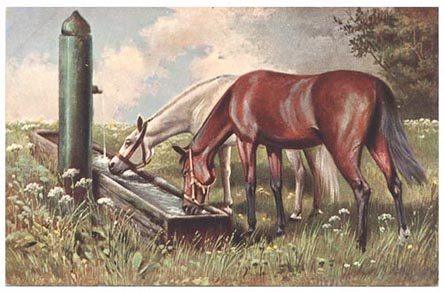Howdy Friends! “Water for horses.” Everyone knows we must provide water for our horses, it is the most important nutrient, and yet this is an area often done along marginal lines.
Most folks know we need to keep water available in the hot summer months, and do. Buckets hung on fences, stock tanks and automatic waterers.
Folks understand the need to keep water available in the coldest winter months as well. Although the largest cause of colic is winter time, lack of water. Breaking the ice is not a satisfactory way to provide adequate water intake. On cold days horses, like we, will not be excited by ice water. Today it is easy to use the many different kinds of heaters to keep that water supply about forty degrees and inviting to the horses.
It matters not the season.
A healthy horse will drink 10-12 gallons of water a day. And yes this will increase on hot days. With varied workloads up to more than 20 gallons sometimes. I’m a big fan of closely monitoring water intake. And not real keen on automatic waterers, or ponds and streams for that reason. Did you know the metal bowls in many automatic waterers, outdoors in the sun, can become too hot to encourage drinking when horses need it most?
I’m also a bit fanatical about the cleanliness.
Keep those buckets, tubs and tanks clean. No I don’t think skimming the grass, hay, bugs and debris off the top is good enough. I always empty and scrub Rosie’s 20 gallon tub at least every few days, there’s never sludge or algae in my mare’s water. If I would not want to drink from it I would expect it of my horse.
Tubs, I believe are better than buckets. Buckets will not hold enough water at 5 to 7 gallons when watering horses only twice a day. I like a nice 20 gallon tub kept sparkling clean. Also be sure to consider herd dynamics. Some timid horses will almost never get their proper amounts of water in group housing with only one tank or tub. Thus leading to chronic health issues never associated with inadequate water intake by the caregiver.
You might consider testing your well or water supply.
Many, hard to diagnose illnesses and symptoms can be traced to high levels of Iron, selenium, arsenic, lead or bacteria. City water, treated with fluoride and chlorine are problematic for horses and that should be considered. It seems horses are more sensitive to chloride and fluoride than humans, though I’ve long ago fallen off the fluoride band wagon for humans as well. If you’d like a bit of an eye opener read about it sometime. Fluoride poisoning in horses has even been linked to chronic coughs, colic, allergies and thyroid issues (Cornell University).
The moral of the story
The most important aspect to maximum health for horses, WATER. It is easy to supply, but often small, all important details, are forgotten or unnoticed. Water for horses! It not only quenches thirst but is paramount in body temperature regulation, digestion, hydration and blood flow to organs.
Water for horses, the very best health enhancement item on the list. ~ Gitty Up, Dutch.









